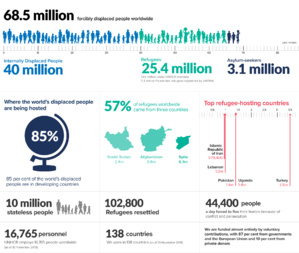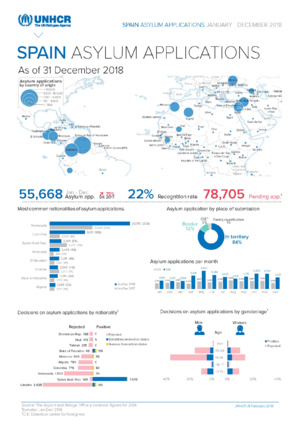As per UNHCR's recent report, we are now witnessing the highest levels of displacement on record. An unprecedented 68.5 million people around the world have been forced from home. Among them are nearly 25.4 million refugees, over half of whom are under the age of 18.
There are also an estimated 10 million stateless people who have been denied a nationality and access to basic rights such as education, healthcare, employment and freedom of movement.
In a world where nearly 1 person is forcibly displaced every two seconds as a result of conflict or persecution, our work at UNHCR is more important than ever before.
Emergency: Europe situation.
In the first half of 2017, over 105,000 refugees and migrants entered Europe. This movement towards Europe continues to take a devastating toll on human life. Since the beginning of 2017, over 2,700 people are believed to have died or gone missing while crossing the Mediterranean Sea to reach Europe, with reports of many others perishing en route. These risks do not end once in Europe. Those moving onwards irregularly have reported numerous types of abuse, including being pushed back across borders.
With so many lives at risk, rescue-at-sea operations undertaken by all actors must remain a priority. Despite some progress in increasing the number of safe pathways to Europe, these opportunities are far too few to offer a feasible alternative to risky irregular journeys for people in need of protection. Further efforts are needed to increase access to existing legal pathways, including family reunification.
UNHCR also calls for European and other countries to offer an additional 40,000 resettlement places, which will complement already existing commitments, to be made available for refugees located in 15 priority countries along the Central Mediterranean route.
Those arriving in Europe need adequate reception and assistance, particularly those with specific needs, including unaccompanied and separated children and survivors of sexual and gender based violence, and access to fair and efficient asylum procedures. More solidarity is needed within the EU to ensure protection, including through efficient and speedy family reunion and relocation.
Overall, there is a need for a comprehensive plan of action that will support long-term solutions to the complex issue of mixed migration and help address its root causes, in close cooperation with countries of origin and transit and in line with international law.
In the first half of 2017, over 105,000 refugees and migrants entered Europe. This movement towards Europe continues to take a devastating toll on human life. Since the beginning of 2017, over 2,700 people are believed to have died or gone missing while crossing the Mediterranean Sea to reach Europe, with reports of many others perishing en route. These risks do not end once in Europe. Those moving onwards irregularly have reported numerous types of abuse, including being pushed back across borders.
With so many lives at risk, rescue-at-sea operations undertaken by all actors must remain a priority. Despite some progress in increasing the number of safe pathways to Europe, these opportunities are far too few to offer a feasible alternative to risky irregular journeys for people in need of protection. Further efforts are needed to increase access to existing legal pathways, including family reunification.
UNHCR also calls for European and other countries to offer an additional 40,000 resettlement places, which will complement already existing commitments, to be made available for refugees located in 15 priority countries along the Central Mediterranean route.
Those arriving in Europe need adequate reception and assistance, particularly those with specific needs, including unaccompanied and separated children and survivors of sexual and gender based violence, and access to fair and efficient asylum procedures. More solidarity is needed within the EU to ensure protection, including through efficient and speedy family reunion and relocation.
Overall, there is a need for a comprehensive plan of action that will support long-term solutions to the complex issue of mixed migration and help address its root causes, in close cooperation with countries of origin and transit and in line with international law.
Persecution, conflicts and human rights violations continue to force people to flee their homes and seek safety in Europe. Many risk their lives and face a treacherous journey.
>Total arrivals
12,349
Last updated 12 Mar 2019
>Sea arrivals in 2019 (includes refugees and migrants arriving by sea to Italy, Cyprus, Greece, Malta and Spain)
9,773
Last updated 12 Mar 2019
>Land arrivals in 2019 (includes refugees and migrants arriving by land to Greece and Spain)
2,576
Last updated 28 Feb 2019
>Dead and missing in 2019 (estimate)
226
Last updated 12 Mar 2019
More statistics
Locations x3: Italy, Greece, and Spain
Updated 6 December 2018
>Total arrivals
12,349
Last updated 12 Mar 2019
>Sea arrivals in 2019 (includes refugees and migrants arriving by sea to Italy, Cyprus, Greece, Malta and Spain)
9,773
Last updated 12 Mar 2019
>Land arrivals in 2019 (includes refugees and migrants arriving by land to Greece and Spain)
2,576
Last updated 28 Feb 2019
>Dead and missing in 2019 (estimate)
226
Last updated 12 Mar 2019
More statistics
Locations x3: Italy, Greece, and Spain
Updated 6 December 2018
What is UNHCR doing to help?
UNHCR, working with partners, is providing a broad range of support and assistance in Europe for refugees and asylum-seekers. These efforts include humanitarian and cash assistance, provision of accommodation and support to improve reception conditions, prevention and response to sexual and gender-based violence, protection monitoring and interventions, engaging with refugee communities to enhance their participation and including their voice in their voice in the response, identification and support to persons with specific needs, including separated and unaccompanied children, and referral to appropriate services.
To adequately respond to the protection needs of refugees and migrants arriving in Europe, UNHCR launched the regional Refugee and Migrant Response Plan (RRMP), involving 60 partners.
To improve the situation of refugee and migrant children arriving and staying in Europe without their parents or care givers, UNHCR, UNICEF and IRC issued a Roadmap and a call to action (1).
UNHCR has sets out a practical vision for the EU’s global engagement with refugees and for the reform of its asylum system in its paper “Better Protecting Refugees in the EU and Globally”.
---
(1) Kindly check "Europe: new Roadmap to improve the situation of unaccompanied and separated refugee and migrant children.", Joint UNHCR/UNICEF/IRC Press Release, July 2017.
UNHCR, working with partners, is providing a broad range of support and assistance in Europe for refugees and asylum-seekers. These efforts include humanitarian and cash assistance, provision of accommodation and support to improve reception conditions, prevention and response to sexual and gender-based violence, protection monitoring and interventions, engaging with refugee communities to enhance their participation and including their voice in their voice in the response, identification and support to persons with specific needs, including separated and unaccompanied children, and referral to appropriate services.
To adequately respond to the protection needs of refugees and migrants arriving in Europe, UNHCR launched the regional Refugee and Migrant Response Plan (RRMP), involving 60 partners.
To improve the situation of refugee and migrant children arriving and staying in Europe without their parents or care givers, UNHCR, UNICEF and IRC issued a Roadmap and a call to action (1).
UNHCR has sets out a practical vision for the EU’s global engagement with refugees and for the reform of its asylum system in its paper “Better Protecting Refugees in the EU and Globally”.
---
(1) Kindly check "Europe: new Roadmap to improve the situation of unaccompanied and separated refugee and migrant children.", Joint UNHCR/UNICEF/IRC Press Release, July 2017.
Tags :
EU emergency on global displacement
Global displacement
Refugee and Migrant Response Plan (RRMP)
refugees and asylum-seekers
UNHCR
Posted by Christopher Oscar de Andrés, on Thursday, March 14th 2019 at 07:25
|
Comments (0)
Category
Recent posts
Archives
10-N
ACNUR
ADHESIÓN DE CROACIA A LA UE
Africa
Agenda 2020 en España
Airbus A320 passengers
Al Jazeera
Amnistía Internacional
Ana Pastor
Angela Merkel
Ant Financial
Ant’s QR-based Health Code System
AnálisisyGestiónInteligenteDeDatos
Asamblea General de Naciones Unidas
Autor Christopher O de Andrés
Autoridad del Canal de Panamá (ACP)
Año Nuevo chino 2017 - el año del Gallo Rojo de Fuego
Boris Johnson
Brexit
Cabify
Caixabank
Calculated risks
Canal de Panamá
CE
CEMEX Mexico
CEN
CENELEC
China
CIA major internal investigation
Comisión Europea
Coronavirus
COVID-19
Covid-19
COVID19
CRISIS FINANCIERA
Cybercrime
David Cameron
Editorial Universitas SA
EU Convention of Human Rights
European Commission
FMI
Henrique Capriles
Human Rights
ICAA
International Business Development
Jack Ma
Jean-Claude Juncker
Mariano Rajoy
Obama
ONU
OSCE
The Council of Europe
Thomas Hammarberg
UNED
UNHCR
Unión Europea
Vladímir Putin








